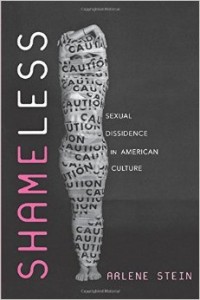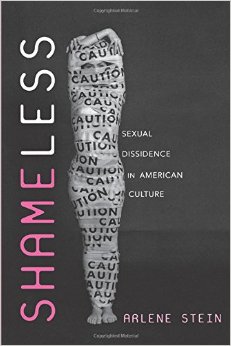 Shameless: Sexual Dissidence in American Culture
Shameless: Sexual Dissidence in American Culture
by Arlene Stein
New York University Press. 224 pages, $21. (paper)
SEXUALITY HAS BECOME perhaps the single most volatile issue in the highly emotional and long-running set of skirmishes known as the “culture wars” that have shaped American culture since the 1970’s. In this sophisticated and subtle collection of essays, sociologist Arlene Stein provides a roadmap to this conflict. “American culture is a curious mix of the shameless and the shamers,” Stein argues, “a seemingly endless parade of Pamela Andersons and Jerry Falwells strutting their stuff and wagging their fingers.”
In the growing body of scholarship on gays and lesbians in American culture, Stein’s innovative volume stands out for at least two reasons: first, she places lesbian cultural politics at the center of a broader analysis; and second, she looks closely at the cultural dynamics and social movements on both sides of the debate over the liberalization of sexual mores. Stein, a Rutgers sociology professor, does not conceal her sympathy for the cultural movement that began in the 1960’s, which allowed people to “focus on speaking publicly about unspeakable things, explicitly in order to loosen shame’s grip.” But religious conservatives have deftly incorporated certain strands of feminist politics while rejecting others, often thwarting advances in the cause of casting off shame.
The book is divided into Part I, “Up from Shame,” whose five chapters center on lesbian cultural politics, and Part II, “Shamed Again,” which addresses the religious Right’s backlash against lesbian and gay rights and family diversity. The essays are rooted in Stein’s largely interview-based research in communities spanning the full gamut of American sexual culture, from Bay Area lesbian sex educators to a rural Oregon housewife and anti-gay activist who, Stein reports, told her, “You know I don’t usually talk to people like you,” and then explained, “I don’t think a whole lot of those people up at the university.”
A major strand in Part I is what Stein calls the “decentering” of lesbian feminism in the past two decades. Readers of two of her previous two books, Sex and Sensibility (1997) and Sisters, Sexperts, Queers (1993) will be familiar with her analysis of the politics of exclusion and boundary-drawing in feminist communities. There’s no mystery about where she stands when she’s recalling her disappointment at Robin Morgan’s 1974 claim that a true feminist cannot be a Rolling Stones fan. Morgan’s claim, as delineated by Stein, was that “lesbian feminists who listened to the Rolling Stones were no better than those who advocated non-monogamy and accepted transsexuals as allies: they had all adopted a ‘male style’ that would destroy the movement.”
Stein offers an illuminating discussion of lesbians’ influence on popular music, charting the ambitions and achievements of “crossover” stars like k. d. lang, Melissa Etheridge, and Mi-chelle Shocked. She points out that musical innovation has always been propelled by subcultures, and notes the concurrent emergence of “women’s music” and of such openly gay and gender-bending male stars as Sylvester, David Bowie, and Boy George. By expanding the genre’s boundaries to comprehend pioneering non-lesbian rock stars like Janis Joplin, Patti Smith, Tracy Chapman, and Sleater-Kinney, Stein implicitly argues for an expanded analysis of the cultural impact of lesbian and women’s music.
The final essay in Part II, “Make Room for Daddy: Anxious Masculinity and Emergent Homophobias,” compares Stein’s research in Oregon in the 1990’s, which served as the basis for her 2002 book The Stranger Next Door, with the successful 2004 campaign to pass a constitutional ban on same-sex marriage. She suggests that the target of the Christian Right’s activism “shifted from masculine men living outside the family to same-sex couples in long-term committed relationships —particularly lesbian couples with children.” What fuels their opposition to same-sex marriage is not so much their interest in gay couples’ relationships as it is their profound sense of victimization related to the decline of patriarchal authority. The chapter goes a long way toward understanding —rather than simply refuting—the Right’s recent refrain that women like Rosie O’Donnell and Mary Cheney are selfishly denying their children “the right to a father.”
The essays in Shameless do not, of course, have the cohesive narrative thread of a monograph, and “shame” does not hold all the essays together equally well. Some previously published essays, too, appear less thoroughly revised than others. A piece on gay and anti-gay rhetorical invocations of the Holocaust, in particular, which was first published in 1998, would have been benefited from considering recent scholarship on the politics of queer Holocaust remembrance by Erik Jensen and Dagmar Herzog. Yet Stein’s book is notable for combining a commitment to qualitative social science methods with an appropriate grasp of its limitations. She is unusually clear-eyed about the shifting politics of knowledge, cleverly drawing a parallel, for example, between Christian conservative views of the nuclear family as a restraint on male desire and similar pronouncements in the 1950’s functionalist sociology of Talcott Parsons.
Stein points out that recent electoral campaigns to ban gay marriage have often drawn selectively from social scientific findings about the benefits of marriage for men, women, and children, frequently misrepresenting them as endorsements of sharply differentiated gender roles. Indeed, the working-class Christian conservative housewife quoted above, asked to explain why she thinks homosexuality “tears down family values,” turns not to the scripture but to what she calls “reputable studies.” Stein’s book reminds us that both sides in the culture wars depend on those we entrust to produce knowledge.
Timothy Stewart-Winter is a Ph.D. candidate in American history at the University of Chicago.






